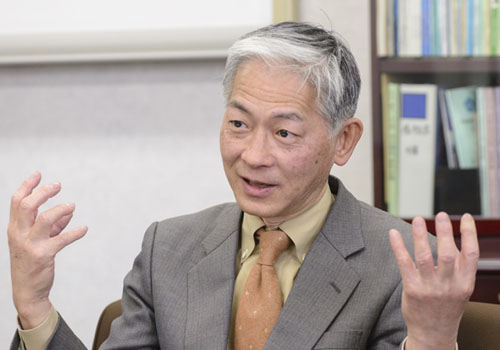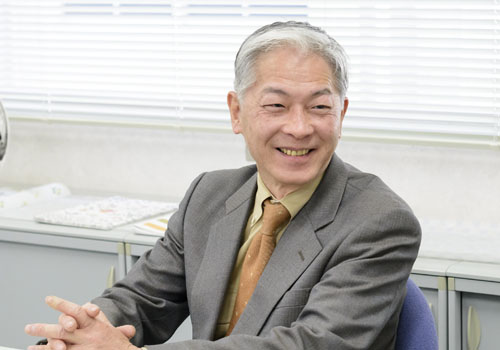
Special interview

A Top AI Researcher Discusses the Future of Informatics
Koichi Takeda Professor
【Graduate School of Informatics】
Future Value Creation Research Center (FVCRC)

I have been a researcher in the field of informatics for more than thirty years now. The main focus of my work has been getting computers to effortlessly respond to human speech—particularly written text. Most of the research being done internationally works with English, but since Japanese is my native language, I think it's important that we are able to handle both. Other Asian languages—including Chinese and Korean—have become extremely popular in recent years as well.
Creating artificial intelligence is extremely challenging when the human brain is still a mystery to us
-What kind of technology do we need to be able to input languages into a computer?
People have been studying ways to make computers understand language for probably around sixty years now—and there was initially a lot more optimism in the field. Most communication between human beings is done unconsciously. We have a truly amazing ability to take in the world of language—understand what we see, communicate with words, listen to voices and sounds, and translate our sensations and thoughts into language. Scientists have been using artificial intelligence research to try to faithfully replicate human senses, cognitive ability, and communication skills, but the fact is that it's extremely difficult to recreate these abilities in a computer. The way the human brain works remains largely a mystery to us. However, we are slowly beginning to make progress with our research, which started by simply doing everything we could to make computers mimic the kinds of responses humans have when they take in certain inputs.
Using big data and image recognition to move AI forward
-The present and future of AI according to Dr. Takeda
Since individuals now carry smartphones, we are able to collect data on all kinds of human behavior—action history, conversations details, and so on. It is now easy to create digital records of what people do and the decisions they make. I think that collecting these massive amounts of data will help move our research forward, as it will allow us to study the kinds of thoughts and and behaviors people are likely to have as well as come up with hypotheses and models that better explain human beings. I think we will make progress in both theoretical research and real-world R&D when it comes to our ability to explain intelligent human action on the basis of big data.
Another development we've seen in the last few years is that computers are now able to identify objects expressed as images with a high degree of precision. Human beings make comprehensive judgments based on sensory information, personal experience, common sense, and a variety of other factors. Everything from driving a car to a physician getting a read on a patient's condition at a glance involves synthesizing all kinds of auditory and visual information, such as how a person speaks, the angle of their gaze, and more. Now that computers are able to recognize images, we may be seeing a gradual shift towards them being able to partially achieve things that only human beings could do before—namely, analyzing and understanding to some extent what is being expressed through various types of media (including text and voice data) and from there making conclusions about a given situation.

AI beats human trivia champions!
-Dr. Takeda's work to pit a computer against human trivia champions.
In 2011—the same year that IBM celebrated its one-hundredth anniversary—the company entered one of its computers as a contestant on a trivia game show. Members of our research center had been doing work on this topic for some time, and it was probably around 2003 when someone got the idea to pit our computer against a human trivia champion. Nobody thought it could be done at the time. Things started to become more optimistic around 2006, particularly at our US lab, and the project was officially launched. The following year, IMB mobilized the language processing technology scientists at all of its research centers and assigned them to the challenge. That's when we got involved, and we ended up working on the research for about four years until the actual competition in February of 2011. When I first heard about the project, I was amazed that they were attempting to tackle something so big. But a project like that only comes around every ten or fifteen years, so I thought it would be an exciting thing to work on even if we couldn't get it to succeed in the short term.
(Note: IBM put its Watson question-answering computer system on the US quiz show Jeopardy! in 2011, where it beat out the reigning game show champions.)
Our system ended up beating the human trivia champions its first time out without any problems, so it appeared as if the task had not been as difficult as we first thought. But I think the fact that we had access to Wikipedia and other online big data sources, which effectively got Watson to arrive at the correct answer, had a lot to do with our success.

Helping informatics mature into a full-blown scientific field
As someone who studies informatics, I very much want to see the subject mature into a full-blown field of scientific inquiry on par with the major sciences—like physics or mathematics. informatics do not just serve as a tool for engineers or for programming computers; underneath those applications lies the implementation of a variety research principles and theories. One is a curiosity about one of the fundamental mysteries of our world, making it no different than the natural sciences, physical sciences, or mathematical sciences. Another fundamental aspect is that of physical creation, in the sense that we are trying to rapidly recreate human cognitive ability on a massive scale in the form of computers. For people who are interested in both of these aspects, it's a tremendously exciting field to be in.
I would guess that people who are in their teens right now are completely inseparable from the world of computers—whether it's the internet or their smartphones. Anything that is cool these days or that offers a new, fresh experience most likely involves some kind of digital service, if only indirectly.
Without a doubt, computers will continue to drive the future in terms of changing the way we live, inspiring a more innovative inquisitiveness, and expanding our abilities and skills. As we make this future world a reality, it is critical that we involve the young students who bring imagination and creativity to their daily lives, and I cannot wait for them to start leading the way in the informatics.
